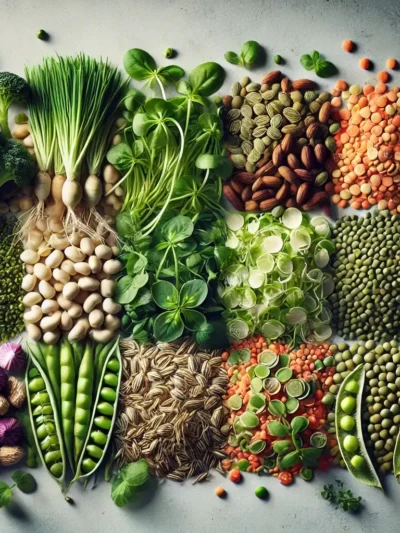The relationship between the food and cancer is a topic increasingly explored by the scientific community, with robust evidence pointing to the crucial role of diet in the prevention and treatment of this disease.
In this article, we will delve deeper into the biological mechanisms involved, the foods that protect and those that increase the risk, as well as offering practical recommendations for an anti-cancer diet.
Biological Mechanisms of Anticancer Protection

Diet influences cancer risk through several complex mechanisms, including:
- DNA damage: Free radicals damage DNA, which can lead to mutations that initiate the cancerous process. Antioxidants found in fruits, vegetables and whole grains neutralize these free radicals, protecting genetic material.
- Chronic inflammation: A diet rich in ultra-processed foods and low in fiber can trigger chronic inflammatory processes, which create an environment conducive to the development of cancer cells.
- Hormonal regulation: Diet can influence levels of hormones such as estrogen and testosterone, which are involved in cell growth and may be linked to the development of certain types of cancer.
- Gut microbiota: A healthy gut microbiota, made up of trillions of beneficial bacteria, plays a crucial role in protecting against cancer by modulating the immune system, producing anti-inflammatory substances and preventing the proliferation of pathogenic bacteria.
- Epigenetics: Diet can influence gene expression without altering the DNA sequence, a process known as epigenetics. Epigenetic changes can lead to the activation of genes that promote cell growth and the inactivation of genes that suppress tumors.
Foods that Protect Against Cancer and Their Mechanisms of Action

- Fruits and vegetables: They are rich in a variety of phytonutrients, such as carotenoids, flavonoids and isothiocyanates, which have antioxidant and anti-inflammatory properties and can induce the death of cancer cells. For example, lycopene in tomatoes can help prevent prostate cancer, while sulforaphane in broccoli can protect against lung cancer.
- Whole grains: The fibers present in whole grains promote satiety, regulate intestinal transit and reduce the time that potentially carcinogenic substances are in contact with the intestinal mucosa. In addition, whole grains are rich in B vitamins, minerals and antioxidants, such as selenium, which has anti-cancer properties.
- Legumes: Legumes are excellent sources of proteins vegetables, fiber, B vitamins and minerals. The isoflavones present in soy, for example, can help reduce the risk of breast and prostate cancer.
- Oily fish: Omega-3 fatty acids, found in fish such as salmon, sardines and tuna, have anti-inflammatory properties and can reduce the risk of several types of cancer, including breast, prostate and colon cancer. In addition, omega-3 can help prevent metastasis, or the spread of cancer cells to other parts of the body.
- Oilseeds: Nuts, seeds and vegetable oils are rich in healthy fats, vitamin E and other antioxidants, which protect cells from damage. Walnuts, for example, are rich in antioxidants and may help reduce the risk of lung cancer.
- Green Tea: The catechins present in green tea have antioxidant and anti-inflammatory properties, which can reduce the risk of several types of cancer, such as esophageal, lung and prostate cancer. In addition, green tea can help inhibit the growth of cancer cells and induce apoptosis, or programmed cell death.
Foods to Avoid and Their Impacts
- Processed meats: High intake of processed meats, such as bacon, sausages and cold cuts, is associated with a higher risk of colorectal cancer due to the presence of carcinogenic substances formed during processing, such as heterocyclic amines and nitrosamines.
- Red meats: Excessive consumption of red meats, such as beef, pork and lamb, is also linked to an increased risk of colorectal cancer. Red meat contains heme iron, which can promote the formation of free radicals and damage DNA.
- Sugary drinks: Regular consumption of sugary drinks has been linked to an increased risk of obesity, type 2 diabetes, and several types of cancer, including esophageal and breast cancer. Sugar can promote inflammation and alter the metabolism hormonal, favoring the development of cancer cells.
- Ultra-processed foods: Ultra-processed foods, such as cookies, snacks, soft drinks and fast food, are generally high in sugar, saturated fat, sodium and chemical additives, and low in essential nutrients. Excessive consumption of these foods is associated with an increased risk of several types of cancer, including breast, prostate and colorectal.
- Alcohol: Excessive alcohol consumption is linked to an increased risk of cancer of the mouth, pharynx, larynx, esophagus, liver and breast. Alcohol can damage DNA, promote inflammation and increase estrogen levels in the body.
Practical Recommendations for an Anticancer Diet

In addition to the recommendations already mentioned, other measures can contribute to a healthier and more preventative diet:
- Cook your food at home: By preparing your own meals, you have greater control over the ingredients and preparation methods, avoiding excess salt, sugar and fat. healthy recipes
- Vary your diet: Eat a variety of fruits, vegetables, whole grains, legumes, lean meats, fish and nuts to ensure you get all the essential nutrients.
- Read food labels: Check the ingredients list and nutritional table to choose healthier products.
- Keep a balanced diet: The amount of food consumed is also important. Avoid excess or lack of any nutrient.
- Practice physical activity regularly: Regular physical activity helps control weight, reduces inflammation and strengthens the immune system.
- Maintain a healthy weight: Being overweight is associated with a higher risk of several types of cancer.
- Do not smoke: Smoking is one of the main risk factors for cancer, accounting for approximately 30% of all cancer deaths.
Conclusion
Nutrition plays a fundamental role in preventing cancer. National Cancer Institute (INCA):
By adopting a balanced diet, rich in plant-based foods and low in ultra-processed foods, you will be investing in your health and reducing the risk of developing this disease.
It is important to emphasize that this article is for informational purposes only and does not replace a consultation with a health professional.
FAQ Table: Nutrition and Cancer Prevention
| Question | Response |
|---|---|
| How can diet influence cancer risk? | Diet influences cancer risk through mechanisms such as free radical DNA damage, chronic inflammation, hormonal regulation, gut microbiota composition, and epigenetic changes that affect gene expression. |
| What foods help prevent cancer? | Fruits and vegetables, whole grains, legumes, fatty fish, nuts and green tea. These foods are rich in antioxidants, phytonutrients, fiber and fats healthy cells that protect against damage and inflammation. |
| What foods should be avoided to reduce the risk of cancer? | Processed meats, red meats, sugary drinks, ultra-processed foods and alcohol. These foods can contain carcinogens, promote inflammation, obesity and hormonal changes. |
| What are free radicals and how do they affect cancer? | Free radicals are unstable molecules that can damage DNA and lead to mutations that initiate the cancer-causing process. Antioxidants found in fruits, vegetables and whole grains neutralize these free radicals, protecting genetic material. |
| What is the role of intestinal microbiota in cancer prevention? | A healthy gut microbiota helps protect against cancer by modulating the immune system, producing anti-inflammatory substances and preventing the proliferation of pathogenic bacteria. |
| How can diet influence cancer-related hormone regulation? | Certain foods can influence levels of hormones such as estrogen and testosterone, which are involved in cell growth and may be linked to the development of certain types of cancer. |
| What is epigenetics and how does diet affect this process? | Epigenetics refers to changes in gene expression that do not alter the DNA sequence. Diet can influence the activation or inactivation of genes that promote cell growth or suppress tumors. |
| What are some practical recommendations for an anti-cancer diet? | Cook at home, vary your diet, read food labels, maintain a balanced diet, exercise regularly, maintain a healthy weight and do not smoke. |
| What are the benefits of green tea in preventing cancer? | Green tea contains catechins, which have antioxidant and anti-inflammatory properties and may reduce the risk of esophageal, lung and prostate cancer. In addition, it may inhibit the growth of cancer cells and induce apoptosis (programmed cell death). |
| What is the relationship between obesity and cancer? | Obesity is associated with an increased risk of several types of cancer due to mechanisms such as chronic inflammation, hormonal changes, and insulin resistance. Maintaining a healthy weight is essential for cancer prevention. |
This table provides a quick and practical overview of the most important aspects of the relationship between diet and cancer prevention.









